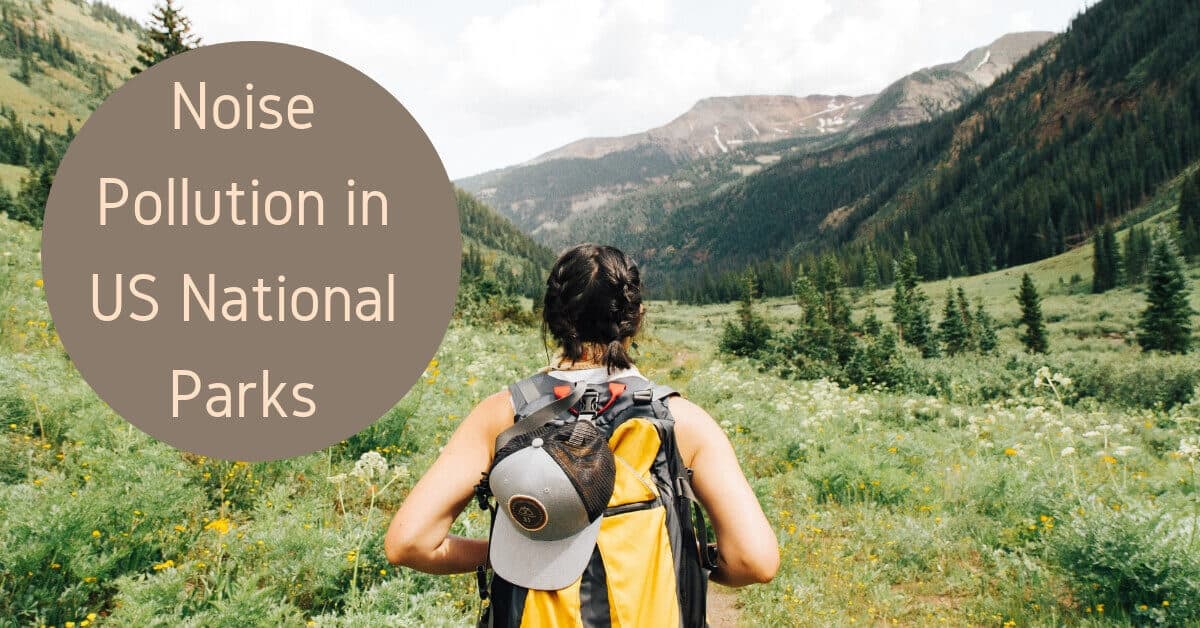Noise pollution isn’t just an issue in big cities, and even in the countryside, peaceful nature sounds are becoming much harder to hear. Noise is all around us, from small towns to farmers fields and everywhere in between. Even our National Parks are becoming noisy places, and noise pollution in the Parks is impacting both wildlife and Park visitors.
Studying Noise in National Parks
In a joint effort between the National Parks Service and the Colorado State University in Fort Collins, researchers measured noise levels at nearly 500 sites all over the U.S. They discovered that noise pollution affects 63% of protected areas, and the areas with the most damaging noise levels are close to cities, like parks and open spaces managed by local governments where you might go for a weekend escape from the noise of the city. National parks are somewhat quieter, but still not safe for animals or visitors. Rachel Buxton, a conservation biologist as CSU says that they “were surprised we found such high levels of noise pollution in such high amounts of protected areas.” In nearly two thirds of our protected spaces, human and industrial noise is over-riding the peaceful sounds of birds singing, the grass rustling in the breeze, and even the noise of rushing rivers and waterfalls.
What Causes Noise Pollution in National Parks?
The National Parks were designated as protected areas to create a safe space for some of the incredible animals that live in our country, and to serve as a quiet place for people who need a little escape from city life, and want to enjoy the natural wonder of the U.S.
Sadly, the noise pollution in our National Parks is getting out of hand, and it’s all manmade. Highways or interstates often cut through these protected areas, and oil and gas extraction are allowed in some parks. Logging is often permitted very close to park boundaries, and all the heavy machinery is extremely loud. Another source of noise is from frequent jets roaring overhead. In some places, the sound levels are 10 times louder than is normal for that area, and this has a profound impact on all the wildlife living within the parks.
Protecting Plants and Animals
Mapping noise levels could be the key to controlling dangerous noise. Knowing what areas experience the most noise will help researchers and policy makers enact change and protect plants and animals from dangerous noise. Nathan Kleist, an ecologist at the University of Colorado, says that this noise map could be the key to protecting endangered species. Safe habitats are critical for many species, and the survival of the endangered animals in our country may depend on keeping noise levels down in these critical habitats.
Many animals need silence to hunt or hide, or to find a mate. For example, a bird that could normally be heard 100 feet away might not be heard over all the noise, and can only communicate with birds within 10 feet. Even plants are impacted by the excessive noise levels. Many rely on rodents or larger animals to disperse seeds, and with all the noise, these creatures might never even approach the plant.
Harming Hearing
Excessive noise in our National Parks might be more than just an annoyance. Extremely loud noises can undo all the benefits of spending time in nature, and might increase your tension rather than helping you relax. Not only that, but people venturing into loud parks might come home with hearing loss. It’s clear that these high levels of noise pollution in U.S. national parks isn’t just impacting the animal kingdom, but is dangerous to human ears as well.
One strategy for reducing noise levels in our National Parks is to run shuttles to and from protected areas, and encourage people to leave their cars outside park boundaries. Not only will this reduce noise, it will also eliminate traffic congestion. Other strategies include restricting logging or extraction sites to areas further away from protected parks to keep our National Parks safe for everyone.
My Hearing Centers
If you’ve experienced hearing loss from noise pollution, inside or outside of the city, visit us at My Hearing Centers to find the perfect hearing devices to match your unique hearing needs.


